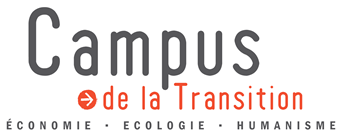The Campus de la Transition aims to transform behaviours towards greater ecological sustainability and social inclusiveness. Combining academic excellence with field research allows the Campus to be grounded in its local context and to address tangible and systemic issues such as sustainable mobility, resilient technologies, carbon neutrality and energy efficiency.
The Campus finds its strength in its unique situation where academic research is directly tested and experimented on the grounds of the castle of Forges, where it is based, and the broader semi-rural area it inscribes itself in. Through this experimental approach, life at the Campus strives to be resilient and resource-efficient while remaining pleasant and welcoming.
These various experiments are thoroughly and rigorously documented in order to set up measurement indicators and prototypes that can inform these objectives of resilience and resource-efficiency.
Established feedback loops from these experiments make it possible to propose pedagogical case studies and course modules that are integrated into the training provided by the Campus.
Our various action-research projects
“Low Carbon Mobility” Project: Designing and Deploying Sustainable and Inclusive Mobility in a Semi-Rural Environment
Partly financed by the Michelin Foundation, this project aims to experiment with alternative, low-carbon and inclusive mobility services for local residents and visitors to the Campus.
The implementation of a bicycle system, including repair workshops, rental services, and proposals for alternative motorisation services, are currently being studied. The project occurs in collaboration with local and regional decision makers of the “Pays de Montereau”.
The ORFEE Project: “Observing, Implementing, Training, Highlighting and Disseminating Resource-Efficient and Resilient Technologies”.
The 2020 winner of the Call for Expression of Interest “Towards a low-tech innovation in Île-de-France” by Ademe (National Agency for the Environment and Energy Management), the ORFEE project aims to set up a low-tech approach on the Campus – as opposed to high tech – allowing the collective to develop devices and tools that are user friendly, resource-saving and sustainable.
Observing the deployment of the project will make it possible to analyse challenges and leverage the implementation of resource efficient and resilient technologies. ORFEE questions the relationship between people and technology, and will share the lessons learned, notably through a live show.
The MC2 Project: Meeting the Challenge of a Low Carbon Footprint
The Maitrise Carbone Campus (MC2) project was launched when the team faced crucial technical choices concerning heating methods and renovation work on the castle of Forges. The question arose as to the compatibility of these technical choices (type of energy used, water heating system, insulating materials, etc.) with the Campus’ long-term goal of achieving greenhouse gas (GHG) emissions neutrality.
Starting in the summer of 2020, the aim of the MC2 project is to measure and then reduce its GHG emissions to the bare minimum by 2028, i.e. 10 years after the creation of the Campus, the GHG emissions induced by all of the Campus activities must be fully understood, tracked and reduced as much as possible.
The measurements of these emissions will be calculated in accordance with the Ademe’s carbon footprint reference framework.
The BATER Project: Building and Energy
The Bâtiment-Energie (BATER) project works on the renovation of the Forges estate, and its 18th century castle. The objective of this working group is to restore such cultural heritage while paying particular attention to energy and resource management.
The aim is to bring the building in line with transition challenges, and to achieve carbon neutrality.
Are you interested in these projects and would you like to know more?
Contact us : contact@campus-transition.org
